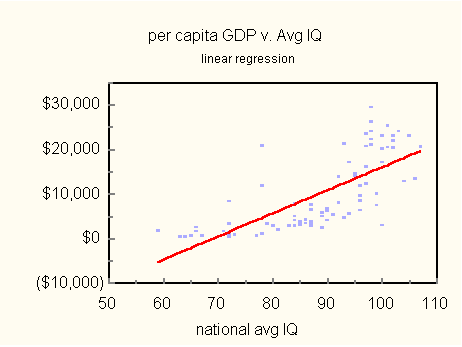
Success of Nations - compared to their citizens' IQ, SQ, Ambition

The chart above shows just how much national wealth depends on the national IQ. A huge 54 percent of the GDP (income per person) difference among nations can be explained by the average IQ in those countries. Reading the 2002
list of personal incomes and IQ's in 127countries shows clearly that the more developed nations have higher average IQ's.The authors who developed this nations' IQ list are well respected. One of them, Lynn, first documented the "Flynn-Lynn effect" - that raw IQ scores have been increasing 2-3 points per decade. Thus he certainly was able to relate and compare the many national IQ studies to each other. The reasons for the national IQ differences, as well as for the Lynn effect, are not well understood. But their impact on a nation's wealth are not much in doubt. One starting point for understanding are the current
theories on causes of racial IQ differences.IQ and the Wealth of Nations describes some factors other than IQ that account for the remaining 46% difference in national income:
- whether the
countries have market or communist economies- unique circumstances such as, in the case of Qatar, by sitting atop a sea of oil
Perhaps the best overall measure determining a nation's income is economic competitiveness (which includes some IQ and corruption measures),
Do SQ and Ambition play a role in economic success?
For individuals, research shows that
social skills (SQ) and ambition play major roles in economic success. But what is true for an individual is obviously not the case for nations, or large groups of individuals. For example, average SQ scores show almost no differences among racial groups. But average IQ scores among racial groups vary considerably, as documented in The Bell Curve. The result is that social skills, which are so important in individual success, have no net impact at the national level. Of course, individual scores for both SQ and IQ vary widely.Ambition, on the other hand, may play a role in national success. In his
Jobs/ Ambition survey, SQ author Sloan did not notice any differences attributable to ethnicity. But cultural differences and lack of exposure to opportunities in the Third World might make Ambition a measurable difference among nations. It is unlikely that the Ambition/ self-skills portion of Goleman's EI is as important at a national level as it is on an individual level. But it could be a factor, like a market economy or lack of corruption in a society.
Leading nations throughout history
|
approximate dates |
years in leadership |
Civilization |
Leading City |
|||||||||||
|
ANCIENT ( BC) |
||||||||||||||
|
4300 |
2700 |
1600 |
Sumerian (Iraq) |
Uruk |
||||||||||
|
2700 |
1075 |
1625 |
Egyptian |
Memphis (Cairo) |
||||||||||
|
1075 |
745 |
330 |
Phoenician (Lebanon) |
Tyre |
||||||||||
|
745 |
612 |
133 |
Iraq/ Iran area |
1. Nineveh (Assyria) |
||||||||||
|
612 |
539 |
73 |
2. Babylon |
|||||||||||
|
539 |
478 |
61 |
3. Susa (Persia) |
|||||||||||
|
478 |
323 |
155 |
Greek |
Athens |
||||||||||
|
323 |
197 |
126 |
Hellenistic (Mediterranean, Egypt) |
Alexandria |
||||||||||
|
197BC |
378AD |
575 |
Roman |
Rome |
||||||||||
|
MIDDLE (AD) |
||||||||||||||
|
378 |
484 |
106 |
Hindu - Gupta (India) |
Pataliputra (Patna) |
||||||||||
|
484 |
589 |
105 |
Byzantine (Turkey) |
Constantinople (Istanbul) |
||||||||||
|
589 |
756 |
167 |
Chinese (T'ang) |
Ch'ang-an |
||||||||||
|
756 |
945 |
189 |
Islamic (Mediterranean) |
Baghdad |
||||||||||
|
945 |
1071 |
126 |
Byzantine (Turkey) |
Constantinople (Istanbul) |
||||||||||
|
1071 |
1294 |
223 |
Sung & Mongol (China) |
Beijing |
||||||||||
|
MODERN (AD) |
||||||||||||||
|
1294 |
1434 |
140 |
Italian Renaissance |
1. Venice |
||||||||||
|
1434 |
1508 |
74 |
2. Florence |
|||||||||||
|
1508 |
1527 |
19 |
3. Rome |
|||||||||||
|
1527 |
1588 |
61 |
Spanish |
Madrid |
||||||||||
|
1588 |
1609 |
21 |
English |
London |
||||||||||
|
1609 |
1672 |
63 |
Dutch |
Amsterdam |
||||||||||
|
1672 |
1814 |
142 |
French |
Paris |
||||||||||
|
1814 |
1830 |
16 |
Austrian |
Vienna |
||||||||||
|
1830 |
1918 |
88 |
British |
London |
||||||||||
|
1918 |
present |
87+ |
American |
New York |
||||||||||
The above list was
developed by Van Sloan in consultation with James Sheehan, chairman of Stanford's history department.
China, a nation of varying success over time
China appears twice in the above list of leading nations. And at the time of the Roman Empire, its civilization was
close to the top. But after 1400 China stagnated. It was almost carved up by smaller but more powerful countries from 1850 - 1950. What changed? The IQ in China of 100 is close to the 102 in modern Italy and Europe (like ancient Rome?) and perhaps above that in the Greece of Byzantine times. Up to 1400AD, there are striking parallels between the Mediterranean and Chinese civilizations. That webpage also presents a theory many have offered that Chinese writing characters prevented it from keeping up with the West. On the other hand, those Chinese characters are credited as a major reason why East Asian IQ's are the highest in the world.
Go to:
Free Markets in a nation's successGo to:
Happiness of various nationsGo to:
Home page on Success
Comments to:
VanSloan@yahoo.comThe ads below are placed by Google.com - they are not necessarily endorsed by this site